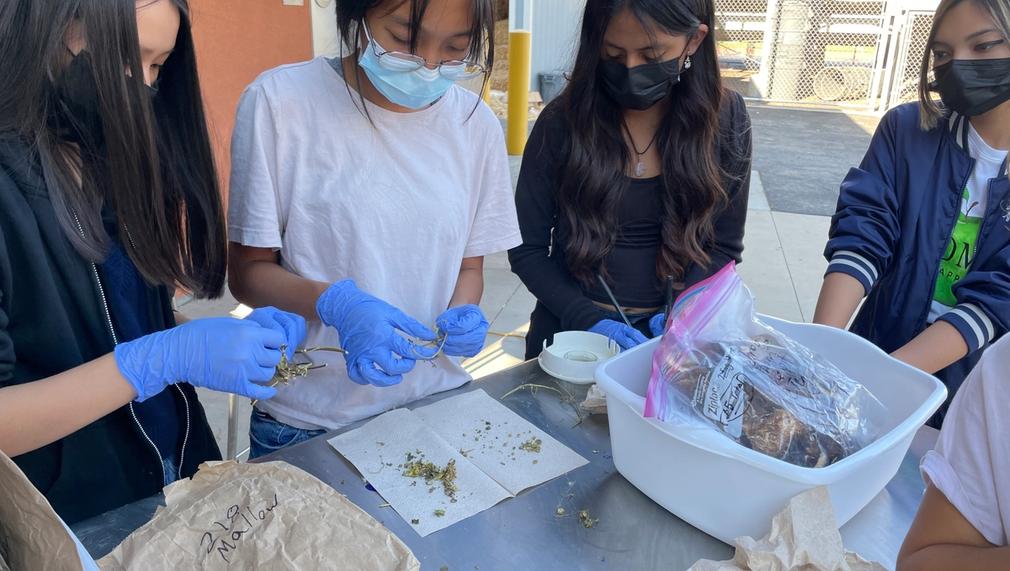River Fellows: Accessing Nature and Jobs
FoLAR's paid LA River Fellowship provides equitable access to green spaces and pathways to eco-STEAM jobs for 9-11th grade students, with priority given to Title I schools and students adjacent to the LA River. Throughout the year-long program, Fellows will connect with eco-Professionals, conduct field research, complete a climate communication certification, lead professional events and presentations, and enjoy camping and kayaking in the LA River Watershed to make meaningful connections with LA ecosystems.

What is the primary issue area that your application will impact?
K-12 STEAM Education
In which areas of Los Angeles will you be directly working?
Central LA
East LA
San Fernando Valley
South LA
County of Los Angeles
City of Los Angeles
In what stage of innovation is this project, program, or initiative?
Expand existing project, program, or initiative
What is your understanding of the issue that you are seeking to address?
Our watershed covers over 800 square miles of the most densely populated, ethnically, and socio-economically diverse region in the US. Nearly 100% of wetlands and riparian habitat in the watershed are lost. Of key concern is disparity of access and use of open space and natural areas by low-income communities and economic paths for reversing the disparity. Linking Angelenos to the environment for the benefit of wildlife, people, and natural areas that remain is essential. By making this connection, residents will appreciate and care for nature in their city and beyond. Meaningful experiences in nature and preparing youth to become environmental stewards for future environmental and climate challenges is key. Workforce development is cited as a parks-related anti-displacement strategy that protects communities, making the Fellows program an opportunity to connect youth to STEM education, job training, and nature while uplifting River-adjacent communities at risk of gentrification.
Describe the project, program, or initiative this grant will support to address the issue.
The program provides field experience and professional certification leading to sustainable paths of employment. We dedicate 4 months for recruitment, to equitably reach as many youth as possible, leveraging teachers and partners. Parents and guardians participate in onboarding to establish a supportive and growth focused mindset. Fellows begin by meeting biweekly online with professionals in environmental or STEM fields (most of whom come from similar backgrounds) focusing on career pathways, leadership, communication, and skill building. A summer's half-day river kayaking trip in their urban ecosystem builds community, a connection to nature, and lends a new perspective on the city. Seven weeks of classes follow, resulting in professional certification as National Network for Oceanic and Climate Change Interpretation "Climate Change Communicators." Summer closes with a 2-day camping trip near LA's water source instilling a sense of belonging and safety in nature and strengthening connections with their peers and mentors. In Fall, they choose a field project: phyto-mycoremediation practices with UC Riverside, community-led design practices with USC'S LA River Integrated Design Lab, or community advocacy with FoLAR. They close by presenting to peers, families, and community partners on their main Program takeaways. Over the course of the year, a total stipend of $1,050 is paid to mitigate some economic burden students or families may face because of their participation.
Describe how Los Angeles County will be different if your work is successful.
When people are inspired, engaged, and informed, they can become part of river revitalization - the heart of our theory of change. We envision access to natural spaces as significantly increased and generations of Fellows transforming the 51-mile River into a dynamic, functioning ecosystem that reduces flood risk, cleans the air, cools temperatures, and supports the biodiversity essential to our collective wellbeing. We hope Fellows pursue green career paths and leverage this program on resumes for jobs or continuing education. In 5-10 years, we hope to see students thriving in the green workforce improving their communities and environment. Longitudinal surveys will follow graduates over 1-10 years post Fellowship. We accepted 30, a fraction of applicants. With greater capacity there's room for more guest speakers, workshops, nature activities, partnerships, field projects, and higher stipends. We could even expand or create 3 cohorts focusing on the Upper, Middle, and Lower River.
What evidence do you have that this project, program, or initiative is or will be successful, and how will you define and measure success?
The program provides potential for short and long-term impacts, a pipeline of dedicated and diverse STEM students into eco-focused careers. Fellows complete pre- and post-surveys measuring changes in response for: - Positive perceptions of nature - Understanding of environmental topics - Understanding of the physical and mental health benefits of nature - SEL skills - Behavioral change involving environmental and civic action - College and career readiness Quarterly, we solicit feedback from teachers, Fellows, families, partners, and professionals to measure implementation, growth in knowledge and confidence, concerns, opportunities, and iterative program improvements. At program's end, we'll survey the cohort and families at 30 and 90 days. Longitudinal studies of the cohorts will guide programming and measure the intended impacts to students and the city over time. Near term, we track returning applicants and meet regularly with faculty to improve curricula and field projects.
Approximately how many people will be impacted by this project, program, or initiative?
Direct Impact: 30
Indirect Impact: 1,000